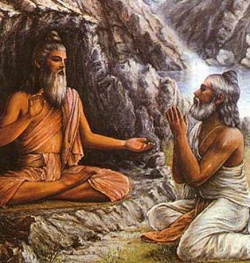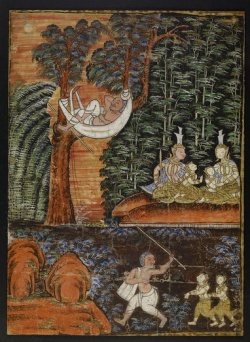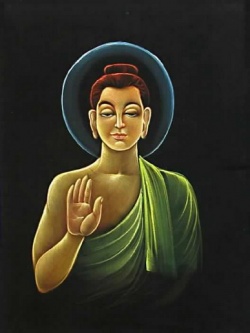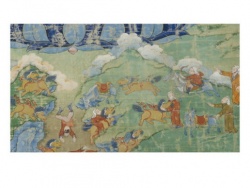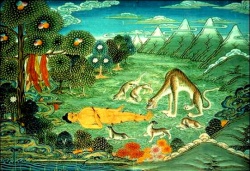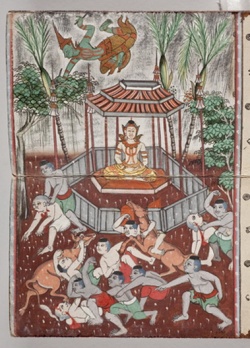Vajra Suchi by Asvaghosha
A Disputation respecting CASTE by a BUDDHIST, in the form of a Series of Propositions supposed to be put by a SAIVA and refuted by the Disputant.--Communicated by B. H. HODGSON, Esq., M.R.A.S.
Read January 1, 1831.
To the Secretary of the Asiatic Society.
Nepal Residency,
SIR: July 11th, 1829.
- A few days since my learned old Bauddha friend brought me a little tract in Sanscrit, with such an evident air of pride and pleasure, that I immediately asked him what it contained. "Oh, my friend!" was his reply, "I have long been trying to procure for you this work, in the assurance that you must highly approve the wit and wisdom contained in it; and, after many applications to the owner, I have at length obtained the loan of it for three or four days. But I cannot let you have it, nor even a copy of it, such being the conditions on which I procured you a sight of it." These words of my old friend stimulated my curiosity, and with a few fair words I engaged the old gentleman to lend me and my pandit his aid in making a translation of it; a task which we accomplished within the limited period of my possession of the original, although my pandit (a Brahman of Benares) soon declined co-operation with us, full of indignation at the author and his work! Notwithstanding, however, the loss of the pandit's aid, I think I may venture to say that the translation gives a fair representation of the matter of the original, and is not altogether without some traces of its manner.
- It consists of a shrewd and argumentative attack, by a Bauddha, upon the Brahmanical doctrine of caste: and what adds to its pungency is, that throughout, the truth of the Brahmanical writings is assumed, and that the author's proofs of the erroneousness of the doctrine of caste are all drawn from those writings. He possesses himself of the enemy's battery, and turns their own guns against them. To an English reader this circumstance gives a puerile character to a large portion of the Treatise, owing to the enormous absurdity of the data from which the author argues. His inferences, however, are almost always shrewdly drawn, and we must remember that not he but his antagonists must be answerable for the character of the data. To judge by the effect produced upon my Brahman pandit--a wise man in his generation, and accustomed for the last four years to the examination of Bauddha literature--by this little Treatise, it would seem that there is no method of assailing Brahmanism comparable to that of "judging it out of its own mouth:" and the resolution of the Committee of the Serampore p. 161 college to make a thorough knowledge of Hindu learning the basis of the education of their destined young apostles of Christianity in India, would thence appear to be most wise and politic: but to return to my little Treatise.
- We all know that the Brahmans scorn to consider the Sudras as of the same nature with themselves, in this respect resembling the bigoted Christians of the dark ages, who deemed in like manner of the Jews. The manner in which our author treats this part of his subject is, in my judgment, admirable, and altogether worthy of a European mind. Indeed it bears the closest resemblance to the style of argument used by Shakspeare, in covertly assailing the analogous European prejudice already adverted to. I need not point more particularly to the glorious passage in the Merchant of Venice: "Hath not a Jew eyes, hands, organs, dimensions, senses, passions; fed with the same food, hurt by the same diseases?" &c. &c.
- The Bauddha Treatise commences in the sober manner of a title page to a book; but immediately after the author has announced himself with due pomp, he rushes "in medias res," and to the end of his work maintains the animated style of vivâ voce disputation. Who ASHU GHOSHA, the author, was, when he flourished and where, I cannot ascertain{!}. All that is known of him at Nepal is, that he was a Maha pandit, or great sage, and wrote, besides the little Treatise now translated, two larger Bauddha works of high repute, the names of which are mentioned in a note.*
I am, &c.
B. H. HODGSON.
I, ASHU GOSHA, first invoking MANJA GHOSHA, the Guru of the world, with all my soul and all my strength, proceed to compose the book called Vajra Suchi, in accordance with the Shastras (Hindu or Brahmanical Sastras).
- Allow then that your Vedas and Smrittis, and works involving both Dharma and Artha, are good and valid, and that discourses at variance with them are invalid, still what you say, that the Brahman is the highest of the four castes, cannot be proved from those books.
Tell me, first of all, what is Brahmanhood? Is it life, or parentage, or body, or wisdom, or the way (áchár), or acts, i.e. morality (Karam), or the Vedas?
- If you say it is life (jiva), such an assertion cannot be reconciled with p. 162 the Vedas; for, it is written in the Vedas, that "the sun and the moon, INDRA, and other deities, were at first quadrupeds; and some other deities were first animals and afterwards became gods; even the vilest of the vile (Swapak) have become gods." From these words it is clear that Brahmanhood is not life (jiva), a position which is further proved from these words of the Mahabharata: "Seven hunters and ten deer, of the hill of Kalinjal, a goose of the lake Mansaravara, and a chakwa of Saradwipa, all these were born as Brahmans, in the Kurukshetra (near Dehli), and became very learned in the Vedas." It is also said by MANU, in his Dharma Sastra, "Whatever Brahman learned in the four Vedas, with their ang and upang, shall take charity from a Sudra, shall for twelve births be an ass, and for sixty births a hog, and seventy births a dog." From these words it is clear that Brahmanhood is not life; for, if it were, how could such things be?
If, again, you say that Brahmanhood depends on parentage or birth (jàti); that is, that to be a Brahman one must be born of Brahman parents,--this notion is at variance with the known passage of the Smritti, that ACHALA MUNI was born of an elephant, and CESA PINGALA of an owl, and AGASTYA MUNI from the Agasti flower, and COUSIKA MUNI from the Cusa grass, and CAPILA from a monkey, and GAUTAMI RISHI from a creeper that entwined a Saul tree, and DRONA ACHARYA from an earthen pot, and TAITTIRI RISHI from a partridge, and PARSWA RAMA from dust, and SRINGA RISHI from a deer, and VYASA MUNI from a fisherwoman, and KOSHIKA MUNI from a female Sudra, and VISWA MITRA from a Chandalni, and VASISHTHA MUNI from a strumpet. Not one of them had a Brahman mother, and yet all were notoriously called Brahmans; whence I infer, that the title is a distinction of popular origin, and cannot be traced to parentage from written authorities.
Should you again say, that whoever is born of a Brahman father or mother is a Brahman, then the child of a slave even may become a Brahman; a consequence to which I have no objection, but which will not consort with your notions, I fancy.
Do you say, that he who is sprang of Brahman parents is a Brahman? Still I object that, since you must mean pure and true Brahmans, in such case the breed of Brahmans must be at an end; since the fathers of the present race of Brahmans are not, any of them, free from the suspicion of having wives, who notoriously commit adultery with Sudras. Now, if the p. 163 real father be a Sudra, the son cannot be a Brahman, notwithstanding the Brahmanhood of his mother. From all which I infer, that Brahmanhood is not truly derivable from birth; and I draw fresh proofs of this from the Manava Dharma, which affirms that the Brahman who eats flesh loses instantly his rank; and also, that by selling wax, or salt, or milk, he becomes a Sudra in three days; and further, that even such a Brahman as can fly like a bird, directly ceases to be a Brahman by meddling with the flesh-pots.
From all this is it not clear that Brahmanhood is not the same with birth: since, if that were the case, it could not be lost by any acts however degrading. Knew you ever of a flying horse that by alighting on earth was turned into a pig?--'Tis impossible.
- Say you that body (Sarìr) is the Brahman? this too is false; for, if body be the Brahman, then fire, when the Brahman's corpse is consumed by it, will be the murderer of a Brahman; and such also will be every one of the Brahman's relatives who consigned his body to the flames. Nor less will this other absurdity follow, that every one born of a Brahman, though his mother were a Kshatriya or Vaisya, would be a Brahman--being bone of the bone, and flesh of the flesh of his father: a monstrosity, you will allow, that was never heard of. Again, are not performing sacrifice, and causing others to perform it, reading and causing to read, receiving and giving charity, and other holy acts, sprung from the body of the Brahman?
- Is then the virtue of all these destroyed by the destruction of the body of a Brahman? Surely not, according to your own principles; and, if not, then Brahmanhood cannot consist in body.
Say you that wisdom* constitutes the Brahman? This too is incorrect. Why? Because, if it were true, many Sudras must have become Brahmans from the great wisdom they acquired. I myself know many Sudras who are masters of the four Vedas, and of philology, and of the Mimansa, and Sanc' hya, and Vaisheshika and Jyotishika philosophies; yet not one of them is or ever was called a Brahman. It is clearly proved then, that Brahmanhood consists not in wisdom or learning. Then do you affirm that the Achár is Brahmanhood? This too is false; for if it were true, many Sudras would become Brahmans; since many Nats and Bháts, and Kaivertas, p. 164 and Bhánds, and others, are everywhere to be seen performing the severest and most laborious acts of piety. Yet not one of these, who are all so pre-eminent in their Achár, is ever called a Brahman: from which it is clear that Achár does not constitute the Brahman.
Say you that Karam makes the Brahman? I answer, no; for the argument used above applies here with even greater force, altogether annihilating the notion that acts constitute the Brahman. Do you declare that by reading the Vedas a man becomes a Brahman? This is palpably false; for it is notorious that the Rakshasa RAVAN was deeply versed in all the four Vedas; and that, indeed, all the Rakshasas studied the Vedas in RAVAN'S time: yet you do not say that one of them thereby became a Brahman. It is therefore proved that no one becomes a Brahman by reading the Vedas.
- What then is this creature called a Brahman? If neither reading the Vedas, nor Sanskar, nor parentage, nor race (Kula), nor acts (Karam), confers Brahmanhood, what does or can? To my mind Brahmanhood is merely an immaculate quality, like the snowy whiteness of the Kundh flower. That which removes sin is Brahmanhood. It consists of Uráta, and Tapas, and Neyama, and Ripavas, and Dan, and Dáma, and Sháma, and Sanyama. It is written in the Vedas that the gods hold that man to be a Brahman who is free from intemperance and egotism; and from Sanga, and Parigraha, and Praga, and Dwesha. Moreover, it is written in all the Sastras that the signs of a Brahman are these, truth, penance, the command of the organs of sense, and mercy; as those of a Chándala are the vices opposed to those virtues. Another mark of the Brahman is a scrupulous abstinence from sexual commerce, whether he be born a god, or a man, or a beast. Yet further, SUKRA ACHARYA has said, that the gods take no heed of caste, but deem him to be the Brahman who is a good man although he belong to the vilest. From all which I infer, that birth, and life, and body, and wisdom, and observance of religious rites (achár), and acts (karam), are all of no avail towards becoming a Brahman.
Then again, that opinion of your sect, that pravrajaya is prohibited to the Sudra; and that for him service and obedience paid to Brahmans are instead of pravrajaya,--because, forsooth, in speaking of the four castes, the Sudra is mentioned last, and is therefore the vilest,--is absurd; for, if it were correct, INDRA would be made out to be the lowest and meanest of beings, INDRA being mentioned in the Parni Sutra after the dog, thus-- p. 165 "Shua, Yua Maghwa." In truth, the order in which they are mentioned or written, cannot affect the relative rank and dignity of the beings spoken of.
What! is PARVATI greater than MAHESA? or are the teeth superior in dignity to the lips, because we find the latter postponed to the former, for the mere sake of euphony, in some grammar sentence? Are the teeth older than the lips; or does your creed teach you to postpone SIVA to his spouse? No; nor any more is it true that the Sudra is vile, and the Brahman high and mighty, because we are used to repeat the Chatur Varána in a particular order. And if this proposition be untenable, your deduction from it, viz. that the vile Sudra must be content to regard his service and obedience to Brahmans as his only pravrajaya, falls likewise to the ground.
Know further, that is is written in the Dharma Sastra of MENU, that the Brahman who has drank the milk of a Sudarni, or has been even breathed upon by a Sudarni, or has been born of such a female, is not restored to his rank by prayáschitta. In the same work it is further asserted, that if any Brahman eat and drink from the hands of a Sudarni, he becomes in life a Sudra, and after death a dog. MANU further says, that a Brahman who associates with female Sudras, or keeps a Sudra concubine, shall be rejected by gods and ancestors, and after death shall go to hell. From all these assertions of the Manáva Dharma, it is clear that Brahmanhood is nothing indefeasibly attached to any race or breed, but is merely a quality of good men. Further, it is written in the Sastra of MANU, that many Sudras became Brahmans by force of their piety; for example, KATHINU MUNI, who was born of the sacrificial flame produced by the friction of wood, became a Brahman by dint of Tapas; and VASISHTHA MUNI, born of the courtezan URVASI; and VYASA MUNI, born of a female of the fisherman's caste; and RISHIYA SRINGA MUNI, born of a doe; and VISHVA MITRA, born a Chandalni; and NARED MUNI, born of a female spirit-seller; all these became Brahmans by virtue of their Tapas. Is it not clear then that Brahmanhood depends not on birth? It is also notorious that he who has conquered himself is a Yati; that he who performs penance is a Tapasya; and that he who observes the Brahma charya is a Brahman. It is clear then that he whose life is pure, and his temper cheerful, is the true Brahman; and that lineage (Kula) has nothing to do with the matter. There are these slokas in the Manava Dharma, "Goodness of disposition p. 166 and purity are the best of all things; lineage is not alone deserving of respect. If the race be royal and virtue be wanting to it, it is contemptible and useless." KATHINA MUNI and VYASA MUNI, and other sages, though born of Sudras, are famous among men as Brahmans; and many persons born in the lowest ranks have attained heaven by the practice of uniform good conduct (sila). To say therefore that the Brahman is of one particular race is idle and false.
Your doctrine, that the Brahman was produced from the mouth, the Kshatriya from the arms, the Vaisya from the thighs, and the Sudra from the feet, cannot be supported. Brahmans are not of one particular race. Many persons have lived who belonged to the Kaivarta Kul, and the Rajaka Kul, and the Chándal Kul, and yet, while they existed in this world, performed the Chura Karan, and Mung-bandan, and Dant-kashtha, and other acts appropriated to Brahmans, and after their deaths became, and still are, famous under the Brahmans.
All that I have said about Brahmans you must know is equally applicable to Kshatriyas; and that the doctrine of the four castes is altogether false. All men are of one caste.
Wonderful! You affirm that all men proceeded from one, i.e. Brahma; how then can there be a fourfold insuperable diversity among them? If I have four sons by one wife, the four sons, having one father and mother, must be all essentiaily alike. Know too that distinctions of race among beings are broadly marked by differences of conformation and organization: thus, the foot of the elephant is very different from that of the horse; that of the tiger unlike that of the deer; and so of the rest: and by that single diagnosis we learn that those animals belong to very different races. But I never heard that the foot of a Kshatriya was different from that of a Brahman, or that of a Sudra. All men are formed alike, and are clearly of one race. Further, the generative organs, the colour, the figure, the ordure, the urine, the odour, and utterance, of the ox, the buffalo, the horse, the elephant, the ass, the monkey, the goat, the sheep, &c. furnish clear diagnostics whereby to separate these various races of animals: but in all those respects the Brahman resembles the Kshatriya, and is therefore of the same race or species with him. I have instanced among quadrupeds the diversities which separate diverse genera. I now proceed to give some more instances from among birds. Thus, the goose, the dove, the parrot, the peacock, &c. are known to be different by their diversities of figure, p. 167 and colour, and plumage, and beak: but the Brahman, Kshatriya, Vaisya and Sudra are alike without and within. How then can we say they are essentially distinct? Again, among trees the Báta, and Bakula, and Palás, and Ashoka, and Tamal, and Nagkeswar, and Shirik, and Champa, and others, are clearly contradistinguished by their stems, and leaves, and flowers, and fruits, and barks, and timber, and seeds, and juices, and odours; but Brahmans, and Kshatriyas, and the rest, are alike in flesh, and skin, and blood, and bones, and figure, and excrements, and mode of birth. It is surely then clear that they are of one species or race.
Again, tell me, is a Brahman's sense of pleasure and pain different from that of a Kshatriya? Does not the one sustain life in the same way, and find death from the same causes as the other? Do they differ in intellectual faculties, in their actions, or the objects of those actions; in the manner of their birth, or in their subjection to fear and hope? Not a whit. It is therefore clear that they are essentially the same. In the Udambára and Panosa trees the fruit is produced from the branches, the stem, the joints, and the roots. Is one fruit therefore different from another, so that we may call that produced from the top of the stem the Brahman fruit, and that from the roots the Sudra fruit? Surely not. Nor can men be of four distinct races, because they sprang from four different parts of one body. You say that the Brahman was produced from the mouth; whence was the Brahmani produced? From the mouth likewise? Grant it--and then you must marry the brother to the sister! a pretty business indeed! If such incest is to have place in this world of ours, all distinctions of right and wrong must be obliterated.
This consequence, flowing inevitably from your doctrine that the Brahman proceeded from the mouth, proves the falsity of that doctrine. The distinctions between Brahmans, Kshatriyas, Vaisyas and Sudras, are founded merely on the observance of divers rites, and the practice of different professions; as is clearly proved by the conversation of BAISHAM PAYANA RISHI with YUDHISTHIRA RAJA, which was as follows: One day the son of PANDU, named YUDHISTHIRA, who was the wise man of his age, joining his hands reverentially, asked BAISHAM PAYANA, Whom do you call a Brahman; and what are the signs of Brahmanhood? BAISHAM answered, The first sign of a Brahman is, that he possesses long-suffering and the rest of the virtues, and never is guilty of violence and wrong doing; that he p. 168 never eats flesh; and never hurts a sentient thing. The second sign is, that he never takes that which belongs to another without the owner's consent, even though he find it in the road. The third sign, that he masters all worldly affections and desires, and is absolutely indifferent to earthly considerations. The fourth, that whether he is born a man, or a god, or a beast, he never yields to sexual desires. The fifth, that he possesses the following five pure qualities, truth, mercy, command of the senses, universal benevolence, and penance.* Whoever possesses these five signs of Brahmanhood I acknowledge to be a Brahman; and, if he possess them not, he is a Sudra. Brahmanhood depends not on race (Kuli), or birth (Jat), nor on the performance of certain ceremonies. If a Bhandál is virtuous, and possesses the signs above noted, he is a Brahman. Oh! YUDHISTHIRA, formerly in this world of ours there was but one caste. The division into four castes originated with diversity of rites and of avocations. All men were born of woman in like manner. All are subject to the same physical necessities, and have the same organs and senses. But he whose conduct is uniformly good is a Brahman; and if it be otherwise he is a Sudra; aye, lower than a Sudra. The Sudra who, on the other hand, possesses these virtues is a Brahman.
Oh, YUDHISTHIRA! If a Sudra be superior to the allurements of the five senses, to give him charity is a virtue that will be rewarded in heaven. Heed not his caste; but only mark his qualities. Whoever in this life ever does well, and is ever ready to benefit others, spending his days and nights in good acts, such an one is a Brahman; and whoever, relinquishing worldly ways, employs himself solely in the acquisition of Moksha, such an one also is a Brahman; and whoever refrains from destruction of life, and from worldly affections, and evil acts, and is free from passion and backbiting, such an one also is a Brahman; and whoso possesses Kshema, and Daya, and Dama, and Dán, and Satya, and Souchana, and Smritti, and Ghrina, and Vidya, and Vijnan, &c. is a Brahman. Oh, YUDHISTHIRA! if a person perform the Brahmacharya for one night, the merit of it is greater than that of a thousand sacrifices (yajna). And whoso has read all the Vedas, and performed p. 169 all the Tirthas, and observed all the commands and prohibitions of the Sastra, such an one is a Brahman! and whoso has never injured a sentient thing by act, word or thought, such a person shall instantly be absorbed (at his death) in BRAHMA. Such were the words of BAISHAM PAYANA. Oh, my friend, my design in the above discourse is, that all ignorant Brahmans and others should acquire wisdom by studying it, and take to the right way. Let them, if they approve it, heed it; and if they approve it not, let them neglect its admonitions.
Footnotes
p. 161
- The Buddha Charitra Kàvya, and the Nandi-Mukhasughosha Avadàn, and other works.
p. 163
- Perhaps it should rather be translated learning. The word in the original is jnyana.
p. 168
The word in the original is Tapas, which we are accustomed to translate "penance," and I have followed the usage, though "ascetism" would be a better word. The proud Tapasyi, whom the very gods regard with dread, never dreams of contrition and repentance.
